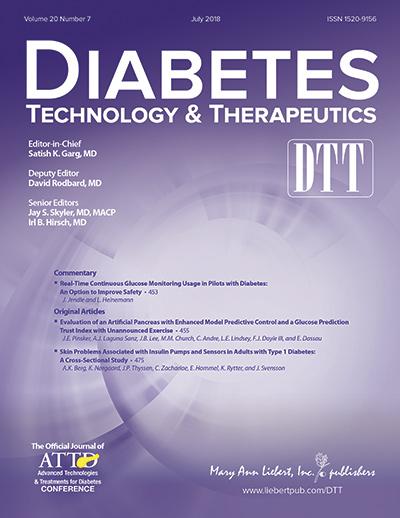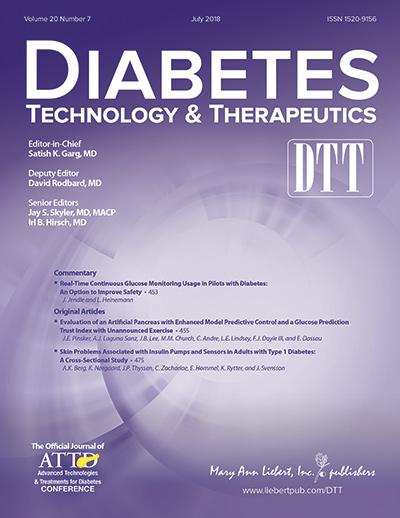
Credit: Mary Ann Liebert, Inc., publishers
New Rochelle, NY, July 2, 2018–A new study has shown that despite excellent glycemic control and low glycemic variability throughout their pregnancies, women with type 1 diabetes tended to give birth to infants who were large for gestational age. Researchers documented elevated fetal weight and abdominal circumference percentages throughout the pregnancies that were consistent with accelerated prenatal growth, as documented in Diabetes Technology & Therapeutics (DTT), a peer-reviewed journal from Mary Ann Liebert, Inc., publishers. The article is available free on the DTT website until August 2, 2018.
Florence Brown, MD, Harvard T.H. Chan School of Public Health, Joslin Diabetes Center, and Harvard Medical School, and coauthors from these institutions and Beth Israel Deaconess Medical Center, Boston, MA, used continuous glucose monitoring (CGM) to determine glycemic variability over a 7-day period in each trimester of the women's pregnancies. In the article entitled "Continuous Glucose Monitoring, Glycemic Variability, and Excessive Fetal Growth in Pregnancies Complicated by Type 1 Diabetes" the researchers reported mean HbA1c of 6.5%, 6.1%, and 6.4% during the first, second, and third trimester, respectively.
"Fetal macrosomia continues to be a problem in patients with type 1 diabetes associated with pregnancy despite improvements in overall glucose control. With the availability of a hybrid-closed loop system, it will be important to see if fetal overweight can be reduced with automatic delivery of insulin based on sensor glucose values," says DTT Editor-in-Chief Satish Garg, MD, Professor of Medicine and Pediatrics at the University of Colorado Denver (Aurora).
###
Research reported in this publication was supported by the National Institutes of Health under Award Numbers T32ES007069 and R01ES026166. The content is solely the responsibility of the authors and does not necessarily represent the official views of the National Institutes of Health.
About the Journal
Diabetes Technology & Therapeutics (DTT) is a monthly peer-reviewed journal that covers new technology and new products for the treatment, monitoring, diagnosis, and prevention of diabetes and its complications. Led by Editor-in-Chief Satish Garg, MD, the Journal covers topics that include noninvasive glucose monitoring, implantable continuous glucose sensors, novel routes of insulin administration, genetic engineering, the artificial pancreas, measures of long-term control, computer applications for case management, telemedicine, the Internet, and new medications. Tables of contents and a free sample issue may be viewed on the Diabetes Technology & Therapeutics (DTT) website. DTT is the official journal of the International Conference on Advanced Technologies & Treatments for Diabetes (ATTD).
About ATTD
The International Conference on Advanced Technologies & Treatments for Diabetes (ATTD) presents top caliber scientific programs that have provided participants with cutting-edge research and analysis into the latest developments in diabetes-related technology. A unique and innovative conference, ATTD brings the world's leading researchers and clinicians together for a lively exchange of ideas and information related to the technology, treatment, and prevention of diabetes and related illnesses.
About the Publisher
Mary Ann Liebert, Inc., publishers is a privately held, fully integrated media company known for establishing authoritative peer-reviewed journals in many promising areas of science and biomedical research, including Thyroid, Metabolic Syndrome and Related Disorders, Journal of Aerosol Medicine and Pulmonary Drug Delivery, Childhood Obesity, and Population Health Management. Its biotechnology trade magazine, GEN (Genetic Engineering & Biotechnology News ), was the first in its field and is today the industry's most widely read publication worldwide. A complete list of the firm's 80 journals, books, and newsmagazines is available on the Mary Ann Liebert, Inc., publishers website.
Media Contact
Danielle Giordano
[email protected]
914-740-2198
@LiebertPub
http://www.liebertpub.com
Original Source
https://home.liebertpub.com/news/joslin-researchers-report-excessive-fetal-growth-despite-well-controlled-type-1-diabetes/2399 http://dx.doi.org/10.1089/dia.2017.0443





